Those of us who dabble in MAGA Kremlinology perked up when the president was asked last weekend who he thought might lead his movement once he’s gone.
It wasn’t the fact that he seemed to rule out running for an unconstitutional third term that caught our attention, although that does count as newsworthy in the ridiculous times in which we live. It was who he mentioned when spitballing ideas for a successor.
“I think we have a tremendous group of people,” Donald Trump told Meet the Press. “You look at Marco. You look at J.D. Vance, who’s fantastic.”
It’s not unheard of for a sitting president to prefer his secretary of state to his VP as heir apparent, but the fact that Marco Rubio’s name came to Trump’s mind before Vance’s did felt significant. For one thing, this was not the first time this year that Trump had conspicuously declined an invitation to anoint J.D. as the presumptive frontrunner in 2028.
But placing Rubio, one of the less Trumpy members of the Cabinet, on an equal footing with the veep was surprising. “That he mentioned Rubio at all struck a senior White House aide as notable,” NBC News reported, “given that it was the first time Trump had so publicly identified him as a favorable prospect.” Some advisers have allegedly come to believe that the president now views the two men as possessed of comparable stature.
And no wonder. Marco Rubio now holds no fewer than four separate positions in the Trump administration as I write this, having ascended to the role of acting national security adviser after Mike Waltz was, uh, reassigned. He’s not there as a placeholder either: Apparently, he’ll serve in the position for at least six months and might win the job permanently in order to give him “more fulsome control” over U.S. foreign policy.
How much influence Rubio actually wields relative to, say, whoever’s in charge of DOGE at the moment is unclear. Some experts believe that the very fact that he has four roles means he can’t be doing much meaningful work in any of them. But there’s a prima facie case that he’s now the second-most powerful official in the U.S. government, ahead of the vice president, and there’s circumstantial evidence that Trump has begun deferring to him. All available evidence suggests that he’s landed near the top of a very short shortlist of whom the president would like to see inherit his movement.
Which is an amazing—amazing—development to those who remember Rubio 1.0. “From a purely selfish political perspective, has Marco Rubio played the Trump era better than any other Republican?” my editor asked me this morning.
Has he?
The Faustian bargain.
Nearly every ambitious conservative in the Republican Party has made a Faustian bargain with Trumpism since 2015—yet hardly any of them wield meaningful power in 2025.
Mike Pence, Mike Pompeo, and Nikki Haley are out of politics, personae non gratae in the second Trump White House.
Ron DeSantis is serving out his time as the governor of Florida under a cloud of scandal and will struggle to overcome a Trumpist grudge to have a second act.
Elise Stefanik made herself into a MAGA firebreather and was rewarded with a nomination to be ambassador to the United Nations, but that was withdrawn when Republicans got nervous about her district potentially turning blue in a special election. Now she’s back in the House, at a lower spot on the totem pole than she was before, her future unclear. She may run for governor of New York. If she does, she’ll probably lose.
Numerous Senate Republicans have kowtowed to the president since 2015, but rarely do any seem to bend his ear successfully on policy. Lindsey Graham has demeaned himself about as thoroughly as a human can, yet he has failed so miserably at convincing Trump to get tough with Russia that recently he resorted to—gasp—moving legislation to address the problem. Very soon, perhaps, he’ll be enlisted to defend a White House nuclear deal with Iran that bears a suspicious resemblance to the hated Obama nuclear deal of 2015.
Mike Lee has become a manic populist fanatic whose chief contribution to politics is wild-eyed Twitter posts. Ted Cruz has become a podcaster with no national constituency, neither populist enough to distinguish himself from the MAGA competition nor conservative enough to earn a Kempian mystique. That two men who were once the face of the Tea Party in Congress are now mainly known as commentators speaks volumes about how much actual governing influence they’ve gained from selling their souls.
Even Trump courtiers in leadership like House Speaker Mike Johnson and Senate Majority Leader John Thune command power mostly symbolically. Despite the fact that their party controls both chambers, Congress under their leadership managed to pass all of six bills during Trump’s first 100 days, the fewest during that period in the last seven decades. Thune presided over the confirmation of what must be the most comprehensively unfit Cabinet in American history; Johnson holds his position essentially at the president’s sufferance. Never in my lifetime has the legislature been as weak as it is now, an achievement in which both men have fully acquiesced.
Assuming they manage to herd cats in their respective conferences and pass Trump’s massive tax-and-spend mega-bill, they’ll place America on a fiscal footing so frighteningly irresponsible that it might trigger a long-awaited debt crisis. That’s what conservative “power” looks like in Year 10 of the Trump era.
You can count on two fingers the number of Republicans who started out hostile to Trump in 2015 yet currently enjoy real influence over national affairs. One is Marco Rubio, a man I once compared to a princess in a conquered kingdom who ends up married off to the leader of the victorious invaders in order to unite the two tribes. Rubio was supposed to be the future of traditional conservatism; now he’s part of the royal family that commands the postliberal barbarian horde and might someday lead it. He’s basically Daenerys Targaryen.
The other, of course, is J.D. Vance.
Game of thrones.
Vance is the only defensible answer besides Rubio to my editor’s question. Arguably, he’s the only correct answer.
Marco entered the Trump era as a sitting senator with his own base of political support in Florida. On Election Day 2016, he famously received more votes in his bid for Senate reelection than Trump did on the same ballot in running for president. It’s cynically impressive that he went on to cultivate a friendship with Trump that led to real power in the government when so many other Republicans have tried and failed, but a sitting senator ascending to the Cabinet is not some novel achievement.
A young commentator ascending from the private sector to the vice presidency at age 40 in less than a decade, though? That’s pretty novel.
Measured by pure degree of difficulty, Vance’s progression from memoirist and Never Trump columnist circa 2016 to red-pilled nationalist blowhard circa 2020 to Tucker- and Thiel-backed MAGA Senate candidate circa 2022 to president-in-waiting circa 2024 is one of the most astonishing feats of political maneuvering in the history of the country. That he pulled it off without any discernible charisma makes it that much more remarkable. How could any Republican have conceivably played the Trump era better than J.D. Vance has?
Unless Trump endorses a rival candidate, it’s hard to imagine how Rubio or anyone else surpasses Vance as heir apparent in 2028. His name recognition is sky high after landing on last year’s ticket, and he’ll serve all four years in Trump’s government, whereas Rubio and other Cabinet officials might not. Absent the sort of economic catastrophe I imagined a few days ago that turns even Republican voters against Trump, the 2028 primary will be a referendum on the president’s legacy. If Donald Trump Jr. isn’t on the ballot, how could anyone have a stronger claim to that legacy than J.D.?
To put that another way: What’s the scenario in which Vance’s stock falls among Republicans yet Rubio’s stock rises between now and 2028? Without a personal scandal that renders J.D. unelectable—and there’s really no such thing in American politics anymore, especially on the right—he’ll be better positioned than Rubio is to take credit for the Trump administration’s achievements, even those on foreign policy for which Rubio might be largely responsible. My guess is that Marco won’t even challenge him in a primary.
Others are guessing that way, too. Vance and Rubio are buddies from their time together in the Senate, it turns out; per Semafor, “allies close to Vance say given the two men’s friendship, they don’t see any scenario in which Rubio and Vance run against one another in 2028.” That doesn’t appear to be wishful thinking by Team J.D., either. Three people in “Rubio’s orbit” told NBC News that they “see Vance as having right of first refusal on the Republican nomination in 2028.”
Vance-Rubio is considerably likelier than Rubio-Anyone, I think. The president might love Marco, but there’s little evidence that enough of his base feels the same way to alter the default assumption of American voters about who’s “next in line.’
Still, there’s a way in which Rubio’s achievement in insinuating himself into Trump’s inner circle is more impressive, and potentially more fruitful, than J.D.’s.
The hybrid candidate.
Unlike Vance, Rubio entered national politics before “Year Zero.”
“Year Zero” is Sarah Longwell’s term for how the grassroots right tends to divide their party’s history into Before Trump and After Trump. “If you forged your political identity pre-Trump, then you belong to a GOP establishment now loathed by a majority of Republican primary voters,” she explained, citing figures like Pence, Haley, and Chris Christie. Because they won office during the ancien régime, the base never fully trusted them as earnest revolutionaries. They could never shake that cloud of suspicion.
Vance doesn’t have that problem. Yes, he was a Never Trumper before he entered politics, but by the time he was first elected to office in 2022, he was a seemingly zealous convert to populism. His political identity was forged After Trump.
Not Rubio. He became a senator in 2011, positioned himself as a traditional conservative hawk with a moderate streak on immigration, and made lacerating (and prescient) arguments in the 2016 primary about how Trump’s ascendancy would degrade the culture of the right. To say that his political identity was minted Before Trump is to understate the case: Rubio was the very embodiment of the party’s future that the Before Trump GOP imagined.
That’s a lot of political baggage for an ambitious conservative to have been toting in Year Zero. Many others who were carrying less were crushed by it and failed to gain durable influence with the president, as I noted earlier.
But Marco somehow pulled it off, perhaps through sheer determination. “Key to Rubio’s ascension in Trump’s inner circle has been how much face time he has spent around Trump both in the White House and at his Mar-a-Lago estate in Florida,” sources told NBC News. “Four senior administration officials [said] that Rubio spends as much time as he can at the White House to be close to Trump, while a person close to him said he has become a regular at Mar-a-Lago, where Trump spends most weekends.”
He may be the only major figure in the party to have successfully rebranded from Before Trump to After Trump, an achievement that requires real political skill and a formidable work ethic. (And a generous degree of sociopathy.) Last summer, I wrote that it’s typically easy to tell whether a conservative politician is pretending to love Trump for cynical reasons or has gone googly-eyed over the president as an earnest convert, but Rubio remains unusually elusive in that regard. If you’re a traditional Republican, you can tell yourself a story about how he’s tempering Trump’s worst impulses behind the scenes; if you’re a populist, you can tell yourself a story about how he’s seen the light.
Ambiguity about his core convictions has been a great political asset to Trump, at least until recently. It’s become an asset to Rubio, too, as the margin when the Senate confirmed him to be secretary of state demonstrates.
I doubt that traditional conservatives will still be a meaningful bloc in the GOP of 2028, but disillusionment with certain Trump policies, like tariffs, could make Rubio’s Before Trump credentials more appealing than they are now. The Floridian could be the only Trump deputy in the administration who’s fully “bilingual,” able to speak with some degree of ideological authenticity to those voters and with some degree to Trumpists. He’s the closest thing the party has right now to a hybrid of the pre- and post-Trump eras.
Even his affect is hybrid in nature. Rubio has embarrassed himself in a thousand ways during his populist journey, but I don’t recall ever seeing him display the sort of tiresome pugilistic lowbrow faux-anger that pretenders like Stefanik often resort to in media appearances to convince the febrile right of their authenticity as “fighters.” Marco is always composed, even soft-spoken, despite representing an administration that prides itself on boorish belligerence. He’s an After Trump populist trapped in the body of a Before Trump Romneyite.
A nominee who can speak to multiple constituencies, coolly and effectively, seems like a better bet in a general election than a figure like Vance with narrower populist appeal, no?
Meanwhile, by climbing so high in the party’s new Trumpist establishment, he’s made himself unquestionably the most influential Latino politician in the United States.
Maybe that matters, maybe it doesn’t. If Trump’s political success means anything, it’s that Hispanics are far less likely to be moved by identity politics than was assumed back when Marco Rubio was pushing comprehensive immigration reform back in 2013. But having finally broken through with that demographic at the polls last November, the GOP is desperate to hold onto Trump’s gains—especially with Latinos beginning to waver amid his trade war and aggressive deportation schemes.
Rubio is living proof that not only are Hispanics welcome on the authoritarian right, the sky’s the limit in terms of how much power and influence they might achieve. In 2025, a country-club Republican making a Latino work four jobs is proof of esteem, not exploitation.
In numerous ways, then, he’s the only conservative left from the Before Trump era to have made himself valuable to the president and the Jacobin movement that now leads the American right. Everyone else who’s tried has stumbled at some point in trying to reconcile Reaganism with Maoism, yet Marco has somehow pulled it off. It’s impressive in a “lol nothing matters” sort of way. He’s not the political hero we want or need, but he’s the one we deserve.
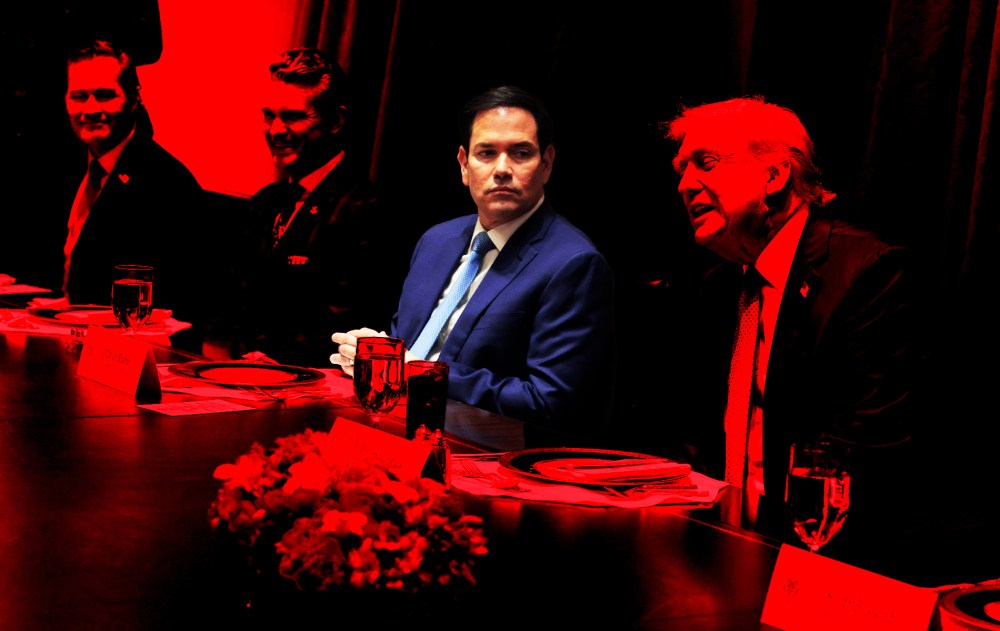

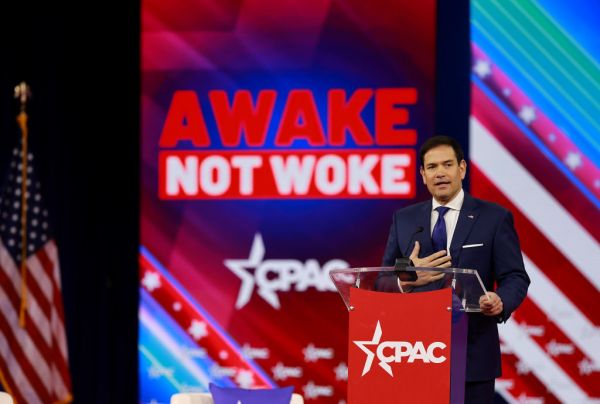
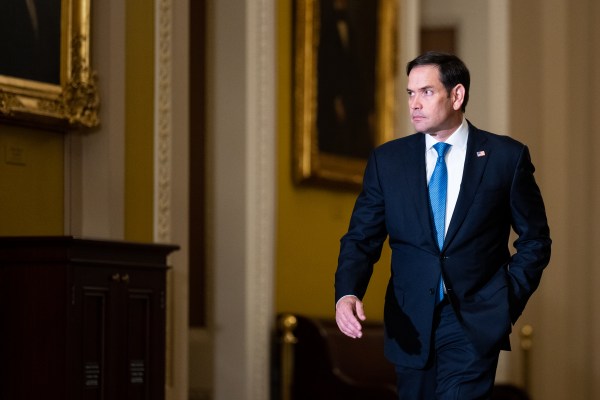
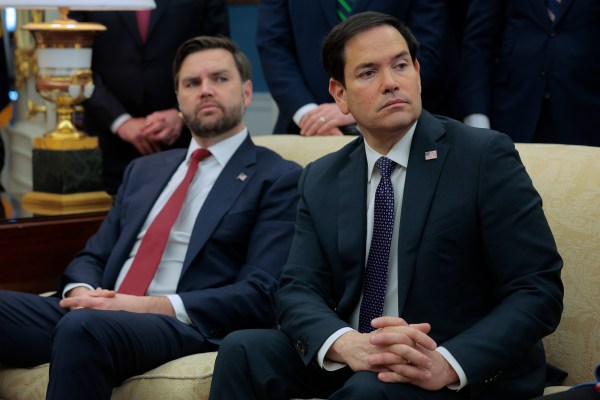
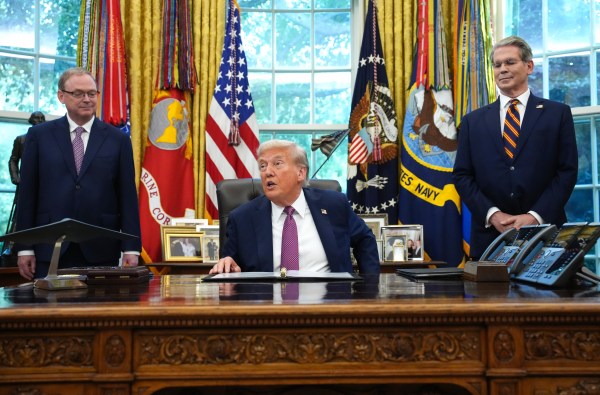
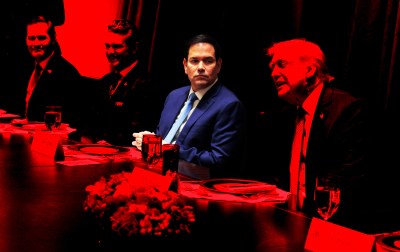
Please note that we at The Dispatch hold ourselves, our work, and our commenters to a higher standard than other places on the internet. We welcome comments that foster genuine debate or discussion—including comments critical of us or our work—but responses that include ad hominem attacks on fellow Dispatch members or are intended to stoke fear and anger may be moderated.
With your membership, you only have the ability to comment on The Morning Dispatch articles. Consider upgrading to join the conversation everywhere.